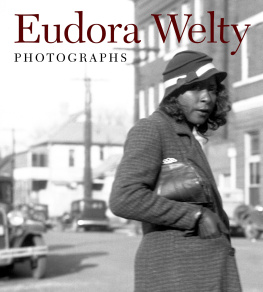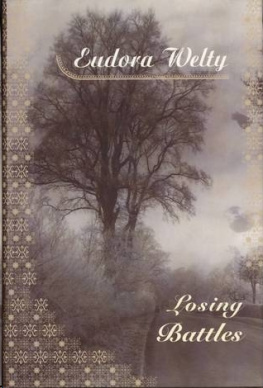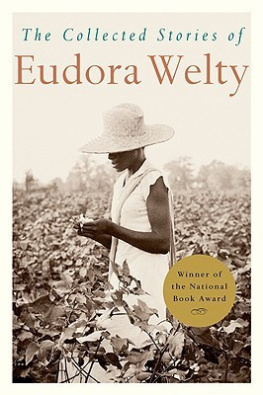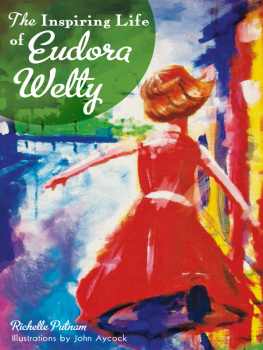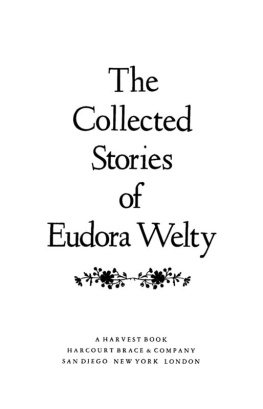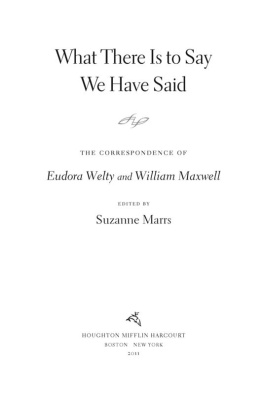Copyright 2005 by Suzanne Marrs
All rights reserved. No part of this publication may be reproduced or transmitted in any form or by any means, electronic or mechanical, including photocopy, recording, or any information storage and retrieval system, without permission in writing from the publisher.
For information about permission to reproduce selections from this book, write to Permissions, Houghton Mifflin Harcourt Publishing Company, 215 Park Avenue South, New York, New York 10003.
www.hmhco.com
Permissions acknowledgments begin on and constitute a continuation of the copyright page.
The Library of Congress has cataloged the print edition as follows:
Marrs, Suzanne.
Eudora Welty: a biography/Suzanne Marrs.1st ed.
p. cm.
Includes bibliographical references and index.
1. Welty, Eudora, 19092001 2. Authors, American20th centuryBiography.
I. Title.
PS3545.E6Z7728 2005
813'.52dc22 2004030490
ISBN -13: 978-0-15-100914-5 ISBN -10: 0-15-100914-7
ISBN -13: 978-0-15-603063-2 (pbk.) ISBN -10: 0-15-603063-2 (pbk.)
e ISBN 978-0-547-53931-7
v2.0215
To Wanda and Alton Marrs
INTRODUCTION
A wide-ranging cast of characters comes to us through the pages of Eudora Weltys fiction: An aged African American woman walks miles through woods, over hills, across log bridges to obtain medicine for her grandson; a small-town postmistress proclaims that she is not one-sided. Bigger on one side than the other; a tenant-farming couple burn their few bits of furniture in an effort to stay warm; a nineteenth-century outlaw plans a slave rebellion in the American Southwest; a young woman commits suicide after a love affair fails; the sorceress Circe declares that it takes phenomenal neatness of housekeeping to put it through the heads of men that they are swine; a Depression-era prison inmate escapes a day before his scheduled release so that he may be on time for his family reunion. From the mouths of these characters or from the pen of Welty as narrator emerge dialogue and descriptions that are hilariousEdna Earle could sit and ponder all day on how the little tail of the C got through the L in a Coca-Cola sign; or hauntingly enigmaticCutting off the Medusas head was the heroic act, perhaps, that made visible a horror in life, that was at once the horror in love; or tragically consolingany life... was nothing but the continuity of its love. Widely considered a master of the short-story form, Welty wrote in many modes, creating the comic terror of a small-town beauty parlor, the 1807 season of dreams that arrived in Mississippi with Aaron Burr, the tortured interior monologue of a husband who imagines beating his wifes lover with a croquet mallet, and a ghost story of sorts in No Place for You, My Love. And her photographs, taken in the 1930s and first collected in 1971, put a human face on the Great Depression as they evince empathy for and from her subjects, black and white, old and young, male and female.
Eudora Weltys achievements were widely recognized during her lifetime: She received a Pulitzer Prize, the French Legion of Honor, the Howells Medal for Fiction, the Gold Medal for Fiction from the National Institute of Arts and Letters, the National Book Foundation Medal for Distinguished Contribution to American Letters, the Presidential Medal of Freedom, and the National Medal of the Arts. She was elected to membership in the National Institute of Arts and Letters and then elevated to the American Academy of Arts and Letters. And she received honorary degrees from at least thirty-nine colleges and universities, Harvard, Yale, Columbia, and Princeton among them. She was surely one of the most honoraried writers in the history of American letters.
Not surprisingly, therefore, Welty looked askance at being the subject for biography. In a 1979 interview, for instance, she said, Ive always been tenacious in my feeling that we dont need to know a writers life in order to understand his work and I have really felt very opposed to a lot of biographies that have been written these days, of which the reviewers say theyre not any good unless they reveal all sorts of other things about the writer... Its brought out my inherent feeling that its good to know something about a writers background, but only what pertains. In 1984, at age seventy-five, Welty hoped to preempt future attempts at a biography of her life by publishing an autobiographical work that focused only on those elements of her life she deemed pertinent. In One Writers Beginnings, which had begun as a series of lectures at Harvard, she followed her hosts suggestion that she describe the ways in which her family, her community, her early reading, her youthful travels, her education, had shaped her career as a writer. These lectures-turned-essays spoke of family love and the tensions inherent in loving, the power of time and the urgency it imposes, the writers passion for her art, and her desire to give it until there is no more left to give. The most memorable events recounted in this book are tragic and emotional in nature: Weltys mother, at the age of fifteen, taking her own father by raft and train to the Baltimore hospital where he died of appendicitis; Eudora, as a young child, discovering with delight two gleaming nickels in her mothers bureau, only to learn that they had covered the eyes of a dead brother she had not known or been told about; and the aspiring writer witnessing, at age twenty-two, her fathers death during a blood transfusion. Painful memories, but she faced them and shared them. She also shared, in an understated fashion, the devotion and the discord, the admiration and the guilt, that characterized her relationship with her mother.
She did not entertain the possibility that Weltys mother might have encouraged her to reject patriarchal wishes, or that Welty might have accepted, comprehended, and transcended aspects of the past without feeling great residual anger, or that One Writers Beginnings was perhaps as truthful as her own account of experience, or indeed that truth resists categorical statements. Heilbrun accepted reviewers interpretations of One Writers Beginnings but offered a rather different assessment of the books veracity.
One Writers Beginnings thus left a vast territory for prospective biographers to explore, and it simultaneously helped to create a myth they might seek to debunk. A number of distinguished scholars began to consider undertaking a full-scale biography but were eventually deterred by Weltys refusal to participate in the project. Then in the mid-1990s Ann Waldron, the biographer of Caroline Gordon and Hodding Carter, decided to make Welty her next subject and to press ahead without the writers cooperation. In Eudora, published by Doubleday in 1998, Waldron attempted to humanize the mythic Miss Eudora but instead created an equally reductive image: the charming and successful ugly duckling. In response to the biography, Claudia Roth Pierpont, writing in the New Yorker, offered a third condescending stereotype, depicting Welty as a perfect ladya nearly Petrified Woman.
I had been a Eudora Welty reader for twenty-three years and her friend for fifteen when these works appeared. I first encountered Weltys fiction in 1975 when I read Losing Battles. I was hooked by the way she walked a tightrope between humor and tragedy, by the way she could structure a four-hundred-page novel so that it had the intricacy of a lyric poem, by the humanity of her characters, by the range of styles she incorporated into a single work. I immediately set about reading all of Weltys works and incorporating some of them into my classes at the State University of New York at Oswego. In 1980 when I took my first sabbatical leave, I decided to write about Weltys fiction. Having done so and published two or three short essays, I was eager to meet the author herself and to discuss
Next page

